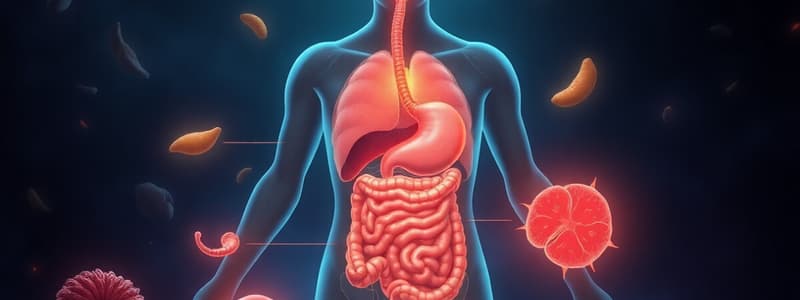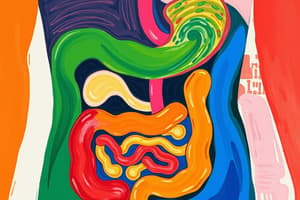Podcast
Questions and Answers
What are the three main components that help the small intestine increase its surface area for absorption?
What are the three main components that help the small intestine increase its surface area for absorption?
Mucosal folds, villi, and microvilli.
Absorption of nutrients mostly takes place in the stomach.
Absorption of nutrients mostly takes place in the stomach.
False (B)
What is the primary function of the esophagus?
What is the primary function of the esophagus?
Transporting food from the mouth to the stomach.
What are the two main types of carbohydrate digestion enzymes found in saliva?
What are the two main types of carbohydrate digestion enzymes found in saliva?
What are the four enzymes found in the brush border that help digest sugars?
What are the four enzymes found in the brush border that help digest sugars?
What are the two types of carrier-mediated transport systems involved in amino acid absorption?
What are the two types of carrier-mediated transport systems involved in amino acid absorption?
What is the primary function of bile salts in lipid digestion?
What is the primary function of bile salts in lipid digestion?
What is the main type of transport system used in the absorption of lipid components?
What is the main type of transport system used in the absorption of lipid components?
Where is the main site for vitamin B12 absorption?
Where is the main site for vitamin B12 absorption?
The digestion of carbohydrates begins once food reaches the stomach.
The digestion of carbohydrates begins once food reaches the stomach.
The absorption of iron is primarily done by active transport.
The absorption of iron is primarily done by active transport.
What is the name of the protein that binds to iron in the epithelial cells?
What is the name of the protein that binds to iron in the epithelial cells?
What are the two main types of vitamins based on their solubility?
What are the two main types of vitamins based on their solubility?
The absorption of water primarily occurs through active transport.
The absorption of water primarily occurs through active transport.
Absorption of sodium electrolytes is primarily passive.
Absorption of sodium electrolytes is primarily passive.
Match the following digestive enzymes with their primary action:
Match the following digestive enzymes with their primary action:
The digestive process for lipids is similar to that of carbohydrates and proteins, involving active transport mechanisms.
The digestive process for lipids is similar to that of carbohydrates and proteins, involving active transport mechanisms.
Chylomicrons are formed inside the intestinal epithelial cells.
Chylomicrons are formed inside the intestinal epithelial cells.
The absorption of water is more efficient in the ileum compared to the duodenum.
The absorption of water is more efficient in the ileum compared to the duodenum.
What hormone is primarily responsible for increasing sodium reabsorption during dehydration?
What hormone is primarily responsible for increasing sodium reabsorption during dehydration?
What is the mechanism of chloride ion absorption in the upper part of the small intestine?
What is the mechanism of chloride ion absorption in the upper part of the small intestine?
Calcium absorption is primarily passive throughout the entire intestinal tract.
Calcium absorption is primarily passive throughout the entire intestinal tract.
What are the two main hormones that regulate calcium absorption?
What are the two main hormones that regulate calcium absorption?
Ferrous iron (Fe++) is less soluble than ferric iron (Fe+++).
Ferrous iron (Fe++) is less soluble than ferric iron (Fe+++).
What is the primary mechanism that prevents excess iron from entering the bloodstream?
What is the primary mechanism that prevents excess iron from entering the bloodstream?
What are the two main categories of vitamins based on their absorption mechanisms?
What are the two main categories of vitamins based on their absorption mechanisms?
Water-soluble vitamins are primarily absorbed passively.
Water-soluble vitamins are primarily absorbed passively.
What is the specific factor required for the absorption of vitamin B12?
What is the specific factor required for the absorption of vitamin B12?
Lipid-soluble vitamins are absorbed through the same mechanisms as lipids themselves.
Lipid-soluble vitamins are absorbed through the same mechanisms as lipids themselves.
Flashcards
Digestion
Digestion
The process by which food is broken down into smaller molecules that can be absorbed by the body.
Absorption
Absorption
The process by which nutrients from digested food are taken into the bloodstream.
Small intestine
Small intestine
The primary site of nutrient absorption in the digestive system.
Mucosal folds (Folds of Kerckring)
Mucosal folds (Folds of Kerckring)
Signup and view all the flashcards
Villi
Villi
Signup and view all the flashcards
Microvilli
Microvilli
Signup and view all the flashcards
Capillary network
Capillary network
Signup and view all the flashcards
Lacteals
Lacteals
Signup and view all the flashcards
Enteric innervation
Enteric innervation
Signup and view all the flashcards
Smooth muscle cells of the muscularis mucosa
Smooth muscle cells of the muscularis mucosa
Signup and view all the flashcards
Brush border enzymes
Brush border enzymes
Signup and view all the flashcards
Starch
Starch
Signup and view all the flashcards
Alpha amylase (Ptyalin)
Alpha amylase (Ptyalin)
Signup and view all the flashcards
Pancreatic amylase
Pancreatic amylase
Signup and view all the flashcards
Maltose
Maltose
Signup and view all the flashcards
Maltotriose
Maltotriose
Signup and view all the flashcards
Lactase
Lactase
Signup and view all the flashcards
Sucrase
Sucrase
Signup and view all the flashcards
Maltase
Maltase
Signup and view all the flashcards
Alpha-dextranase
Alpha-dextranase
Signup and view all the flashcards
Sodium-linked glucose transport
Sodium-linked glucose transport
Signup and view all the flashcards
Facilitated diffusion of fructose
Facilitated diffusion of fructose
Signup and view all the flashcards
Solvent drag
Solvent drag
Signup and view all the flashcards
Protein digestion
Protein digestion
Signup and view all the flashcards
Pepsin
Pepsin
Signup and view all the flashcards
Endopeptidases
Endopeptidases
Signup and view all the flashcards
Exopeptidases
Exopeptidases
Signup and view all the flashcards
Bile
Bile
Signup and view all the flashcards
Lipid digestion
Lipid digestion
Signup and view all the flashcards
Pancreatic lipase
Pancreatic lipase
Signup and view all the flashcards
Co-lipase
Co-lipase
Signup and view all the flashcards
Triglyceride
Triglyceride
Signup and view all the flashcards
Absorption of water and electrolytes
Absorption of water and electrolytes
Signup and view all the flashcards
Aldosterone
Aldosterone
Signup and view all the flashcards
Study Notes
Digestion and Absorption
- Digestion involves enzymes breaking down carbohydrates, proteins, and lipids.
- Absorption is by specialized epithelial cells.
- Most absorption happens in the small intestine, some in the stomach, and none in the esophagus.
- The colon absorbs remaining water and electrolytes.
- The small intestine's structure increases nutrient absorption.
- Mucosal folds (Kerckring folds) triple surface area
- Villi increase surface area tenfold
- Microvilli on epithelial cells increase absorption 20 times, leading to a total surface area of about 600 folds.
Carbohydrate Digestion and Absorption
- Carbohydrates are ingested as starch, sucrose, lactose, and cellulose.
- Cellulose cannot be digested.
- Digestion starts in the mouth with salivary amylase (ptyalin).
- Salivary amylase breaks down 1-4 alpha-glycosidic bonds in starch.
- Pancreatic amylase further breaks down starch into maltose and maltotriose.
- Brush border enzymes (lactase, sucrase, maltase) hydrolyze disaccharides.
- Final products are glucose, fructose, and galactose, which can be absorbed.
Protein Digestion and Absorption
- Protein digestion begins in the stomach with pepsin and HCL.
- Pepsin and HCl break down peptide bonds, creating large polypeptides.
- Proteolytic enzymes (endopeptidases and exopeptidases) in the small intestine further break these down.
- Brush border enzymes (peptidases) break down peptides into oligopeptides and then amino acids.
- Di- and tripeptides are absorbed via a carrier-mediated transport system.
- Amino acids are absorbed through Na+-dependent carriers.
Lipid Digestion and Absorption
- Bile salts emulsify lipids, creating smaller droplets.
- Pancreatic lipase digests triglycerides into free fatty acids (FFAs) and monoglycerides.
- FFAs, monoglycerides, cholesterol, phospholipids, and bile salts combine to form micelles.
- These micelles diffuse into the epithelial cells.
- Inside the cells, FFAs and monoglycerides reform into triglycerides.
- Triglycerides combine with cholesterol and phospholipids to form chylomicrons.
- Chylomicrons are expelled from cells via exocytosis and enter lymphatic vessels.
- Glycerol and short-chain fatty acids are absorbed directly into capillaries.
Water and Electrolyte Absorption
- Water absorption is driven by sodium transport.
- Water follows sodium into the cells through tight junctions.
- Electrolytes (e.g., sodium, chloride, potassium) are actively absorbed in the small intestine and colon.
Studying That Suits You
Use AI to generate personalized quizzes and flashcards to suit your learning preferences.




